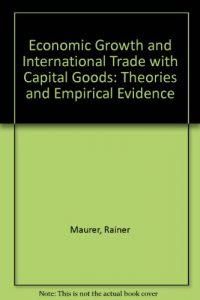
The process of globalization is increasing the integration of all kinds of economic activity. Meanwhile, the international division of labor has reached levels unprecedented in history. The neoclassical theories of international trade predict positive net welfare effects of international economic integration; yet, in so doing, they primarily focus on static welfare effects. Early critics of the “free trade paradigm”, like Friedrich List, hold that this focus on static welfare effects is a major shortcoming of these theories. New developments in the theory of economic growth make it possible now to analyze the dramatic effects of international trade on economic development and to develop new theories.
In the first part of his book, Maurer derives different sets of conditions necessary for international trade to have a positive or negative effect on economic development. In the second part, he estimates the effects of international trade with capital goods on economic growth: the effect imports of capital goods may have on the transition towards steady state and the effect the international trade with capital goods may have on total factor productivity growth. The results indicate that capital goods imports have a significant positive effect on both sources of economic growth.
Author: Robert Allen, Rainer H. Maurer,
Binding: Hardcover
EAN: 9783161469220
Manufacturer: Kiel Inst of World Economics
Number of pages: 246
Product group: Book
Studio: Kiel Inst of World Economics
Publication Date: 1998-10
Publisher: Kiel Inst of World Economics
Pages: 246
ISBN: 3161469224
 Swiss Economicblogs.org
Swiss Economicblogs.org
